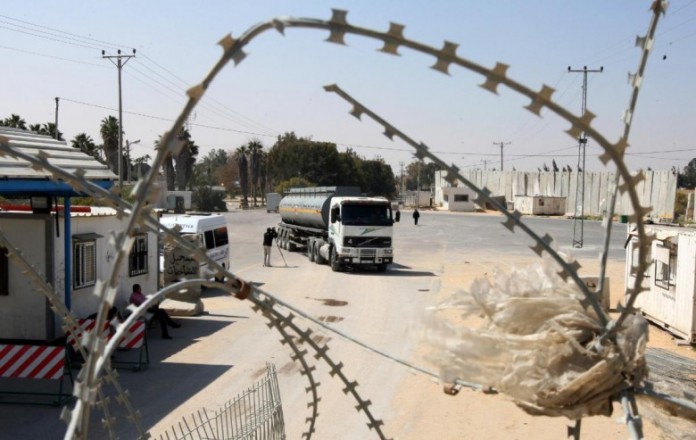
Ref: 21/2016
The Palestinian Center for Human Rights (PCHR) published a new report as part of the series of the monthly “Closure Reports” addressing the latest developments of the state of the Gaza Strip border crossings in April 2016. The report documents the impact of the ongoing Israel-imposed siege on Palestinian civilians, which affects their economic and social conditions. It also refutes Israel’s claims that it has eased the closure of the Gaza Strip for the ninth consecutive year. Furthermore, the report highlights that the continuing Israeli measures aim at the institutionalization of the closure and making the illegal restrictions imposed on the movement of persons and goods acceptable on the international level although they violate the international law, including the international humanitarian and human rights laws.
During the reporting period, the number of truckloads that were allowed to enter the Gaza Strip increased; however, no remarkable change was witnessed on the commercial level. Israeli forces allowed the entry of 10,273 truckloads, the majority of which were foodstuffs and consumables; an average of 342 truckloads daily, while they allowed in March the entry of 17,241 truckloads; an average of 556 truckloads daily. This means a decline of 38.4%. Many obstacles were imposed on the entry of imports, including the frequent closure of the only commercial crossing in the Gaza Strip, Karm Abu Salem (Kerem Shalom); the crossing was closed for 11 days (36.6% of the total period).
In a later step, Israeli forces prevented the entry of construction materials for the private sector in Gaza city.[1] As a result, hundreds of private under-construction housing projects stopped in addition to other Reconstruction projects carried out by the private sector for the same reason. Stopping construction works in these projects will aggravate the suffering of civilians who are desperate need of building their houses and facilities. This will also inflict heavy losses on the private sector’s companies due to stoppage of work and increase the already high unemployment and poverty rates among the workers and their families. In a limited exception, the Israeli authorities allowed the entry of very limited quantities of construction materials for the intentional organizations and Qatari projects. According to the National Ministry of Economy, the Israeli authorities allowed the entry of 15,440 tons of cement, 7,200 tons of construction steel and 153 tons of aggregate ( 1%, 1.4% and 5.1% of the total construction materials needed for the Gaza Reconstruction.)
Concerning the exports, Israeli forces continued to impose a ban on the Gaza Strip exports to the West Bank, Israel and abroad with the exception of limited quantities. During the reporting period, 146 truckloads were allowed for exportation to the West Bank; 133 truckloads of which were agricultural products (strawberries, tomatoes, potatoes, sweet potatoes, cucumbers, cabbages, dates, cauliflower, lemons, oranges, hot peppers, sweet peppers, garlics, eggplants, squashes and mint), 3 truckloads of fish, 4 truckloads of furniture, 3 truckloads of clothes, 3 truckloads of scrap and a truckload of stationary. The rate of the Gaza Strip exports for April constitutes 3.2% of the exports before June 2007.
As for the movement of persons, the Gaza Strip population has been denied their right to the freedom of movement and has been suffering due to obstacles imposed on their movement at all border crossings that connect the Strip with the West Bank and Israel.
Moreover, during the reporting period, Israeli forces imposed severe restrictions on the movement of Gaza population at Beit Hanoun (Erez) crossing, the only crossing for the movement of persons to the West Bank, including Jerusalem, and/or Israel. As a result, 2 million people have been denied their right to the freedom of movement. A limited number of Palestinians were allowed to travel via the crossing: 1,291 patients, 1,220 patient companions. Furthermore, Israeli forces arrested 2 patients who were on their back from hospitals in which they were transformed to receive treatment. One of the patients suffers from serious diseases and could not found a cure in the Gaza Strip hospitals.
During the reporting period, Israeli forces, 1,649 people with special needs, 714 workers of international humanitarian organizations and 165 persons travelling via al-Karama crossing. It should be noted that these estimations do not emphasize the number of persons allowed to travel which is much less than times of travel. Those who have permits are allowed to travel more than one time a month. They also allowed 183 elderly people to cross BeitHanoun (Erez) crossing and perform prayers in al-Aqsa Mosque and 994 Christian citizens under complicated security measures and created obstacles in front of them for many days before allowing them to enter the Strip. It should be noted that these statistics do not express the number of people allowed to travel as the number permit holders is far less than the passing times. The permit holder is allowed to travel more than one time via the Beit Hanoun crossing.
During the reporting period, Rafah International Crossing Point was closed during April for 30 days. This unveiled the reality of the situation in the Gaza Strip under the policy of collective punishment and the Israeli closure imposed over all border crossings, especially Beit Hanoun crossing. The number of Palestinians, who registered for traveling via the crossing and are waiting for their turn to travel, was over 30,000, including 5,000 patients, in addition to thousands of Palestinians who want to travel but did not registered for traveling according to the Ministry of Interior in Gaza.
In the report’s recommendations, PCHR called upon the international community, particularly the High Contracting Parties to the Fourth Geneva Convention Relative to the Protection of Civilian Persons in Time of War, to immediately intervene to compel Israeli authorities to open the Gaza Strip crossings and put an end to the grave deterioration of humanitarian situation in the Gaza Strip.
[1] On 03 April 2016, Israeli authorities officially banned the entry of construction materials for the private sector in Gaza city.
… [Trackback]
[…] Info to that Topic: pchrgaza.org/pchr-publishes-new-report-in-april-2016-as-part-of-the-closure-reports-series/ […]